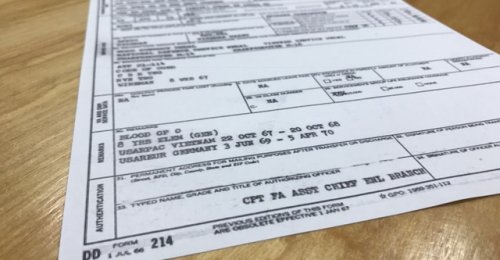DoD Memorandum Clarifying Guidance to Discharge Review Boards Considering Requests for Discharge Modifications Due to Mental Health Conditions, TBI, Sexual Assault, or Sexual Harassment

DoD Memorandum Clarifying Guidance to Discharge Review Boards Considering Requests for Discharge Modifications Due to Mental Health Conditions, TBI, Sexual Assault, or Sexual Harassment

Generally
On August 25, 2017, the Department of Defense (DoD) issued the Kurta Memo. The memo gave clear guidance to Military Discharge Review Boards (DRB) and Boards for Correction of Military/Naval Records (BCM/NR) on discharge upgrade applications. Specifically, the memo talked about applications for a change of a discharge due to:
- Mental health conditions,
- Traumatic brain injury,
- Sexual assault, or
- Sexual harassment.
The memo tells the reviewers to ask four questions:
- Did the veteran have a condition or experience that may excuse or mitigate the discharge?
- Did that condition exist or did that experience occur during military service?
- Does that condition or experience actually excuse or mitigate the discharge?
- Does that condition or experience outweigh the discharge?
The memo guidance tells boards to give broad consideration when the application is based – at least in part – on issues relating to mental health conditions like Post Traumatic Stress Disorder (PTSD), Traumatic Brain Injury (TBI), Sexual assault, or Sexual harassment. Evidence of those conditions or experiences can come from sources outside a veteran's service record and may include:
- Records from the DoD Sexual Assault Prevention and Response Program
- Law enforcement authorities
- Rape crisis centers
- Mental health counseling centers
- Hospitals
- Physicians
- Pregnancy tests
- Tests for sexually transmitted diseases
- Statements from family members, friends, roommates, co-workers, fellow servicemembers, or clergy
Evidence may also consider behavioral or situational changes, like:
- Changes in behavior
- Requests for transfer to another military duty assignment
- Deterioration in work performance
- Inability of the individual to conform their behavior to the expectations of a military environment
- Substance abuse
- Episodes of depression
- Panic attacks
- Anxiety without an identifiable cause
- Unexplained economic or social behavior changes
- Relationship issues
- Sexual dysfunction
Evidence of misconduct, including any misconduct related to a veteran's discharge, may also be evidence of a mental health condition, including PTSD, TBI, Sexual assault or Sexual harassment.
The veteran's testimony alone may establish evidence of a condition or experience.
This is very important as veterans may not be diagnoses with a mental health condition or disclose a sexual assault until after they have been discharged. However, as a result of their trauma, they may have committed misconduct that led their branch of service to discharge them. Under the guidance from this memo, the act of misconduct itself, can be evidence that a mental health diagnosis or assault was impacting the veteran at the time of discharge.
Questions that need to be answered include the following:
Was there a condition or experience?
- Generally, a diagnosis made by a licensed psychiatrist or psychologist is evidence the veteran had a condition that may excuse or change the discharge.
- Evidence that could reasonably support more than one diagnosis should be considered supporting a diagnosis that could excuse or change the discharge.
- A veteran claiming a mental health condition without a diagnosis will receive extra consideration of any evidence that may support the existence of such a condition.
- Review Boards are not required to find that a crime of sexual assault or an incident of sexual harassment occurred in order to grant consideration to a veteran that the experience happened during military service, was aggravated by military service, or that it excuse or mitigates the discharge.
Did it exist or occur during military service?
- A diagnosis made by a licensed psychiatrist or psychologist that the condition existed during military service will receive broad consideration.
- A determination made by the Department of Veterans Affairs (VA) that a veteran's mental health condition, including PTSD, TBI, sexual assault or sexual harassment, is connected to military service, while not binding on the DoD, is considered persuasive evidence that the condition existed or the experience occurred during military service.
Does the condition or experience excuse or mitigate (change) the discharge?
- Conditions or experiences that may reasonably have existed at the time of discharge will be broadly considered as excusing or mitigating (changing) the discharge.
- Evidence that may reasonably support more than one diagnosis or a change in diagnosis, particularly where the diagnosis is listed as the narrative reason for discharge, will be liberally construed as warranting a change in narrative reason to "Secretarial Authority," "Condition not a disability," or another appropriate basis.
Does the condition or experience outweigh the discharge?
- In some cases, the severity of the misconduct may outweigh any mitigation from mental health conditions, including PTSD, TBI, sexual assault or sexual harassment.
- Additionally, premeditated misconduct is generally not excused by mental health conditions, including PTSD, TBI, or by a sexual assault or sexual harassment experience.
- However, substance-seeking behavior and efforts to self-medicate symptoms of a mental health condition may warrant consideration.
- Review Boards will exercise caution in assessing the relationship between asserted conditions or experiences and premeditated misconduct.
Additional clarifications
You can read these DoD Memorandum for the full text and additional clarifications:
| Attachment | Size |
|---|---|
| New DoD Memorandum.pdf466.75 KB | 466.75 KB |
| DoD Press Release.pdf141.09 KB | 141.09 KB |
| DoD Article.pdf229.66 KB | 229.66 KB |
